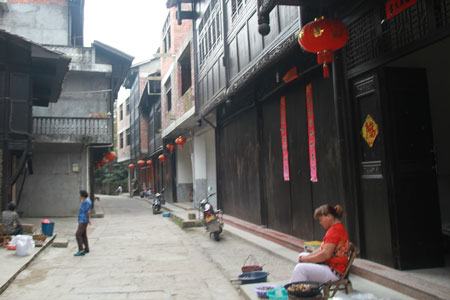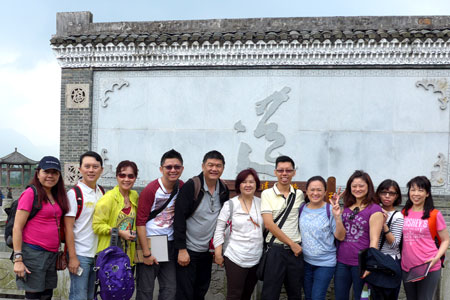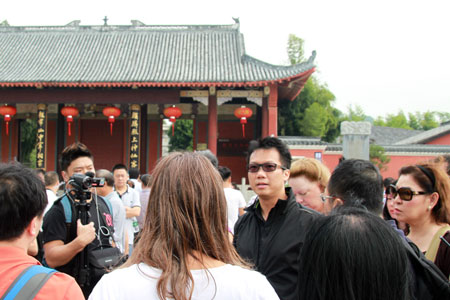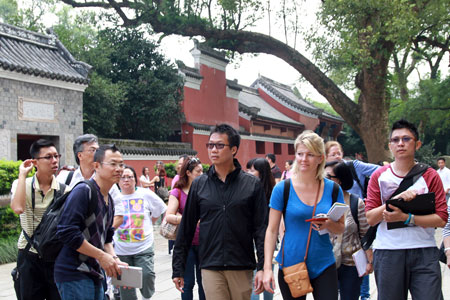| September 21, 2014
The third day of Feng Shui Excursion began with high spirits as students looked forward to brand new adventure and important Feng Shui lessons from Dato' Joey Yap.
The morning session kicked off with Dato' Joey leading the students to three Feng Shui sites: Shangqing Ancient City, Great Shangqing Palace and Tian Men Shan. While on the coach on the way to the first destination, Dato' Joey announced that they would be visiting a special site with an incredible view of 9 different mountains. Chit-chats broke as students began to speculate on the possible sites on their itinerary. As a beginner, I was just excited to begin the journey and learn from more experienced fellow students and Dato' Joey himself.
First stop: Shangqing Ancient City. This tourist attraction is a sight to behold; with its age old architectural, streets and shops that mimic those in ancient old period movies, wishing trees, it is not surprising that tourists from around the world flock to this oldie destination. However, the purpose of our visit was not for sight-seeing, but rather to assess the Feng Shui of this place and if possible, to know why this ancient town receive a high number of tourists. Get this: the town actually doesn't have a good Feng Shui support to boost. But this is not to say that the town itself is not located in a good Feng Shui area. The key here is tapping into the right direction, revealed Dato' Joey.
Therefore, even though the city is blessed to have the highly auspicious Fairy Bridge Formation and an Incoming Dragon, One Character Table mountain at the front of the main entrance, Dato' Joey revealed that the town is not tapping into this positive natural energy. The most important reference point of a Feng Shui assessment is the gateway or entrance as it determines the orientation of the entire property or in this case, a small town. In this example, students can clearly see that the gateway to this town doesn't face or tap into the prosperous direction of the river as it overlooks the other direction. With that cleared up, the students began to observe the natural landforms in the area and some even proposed several solutions to tap into the right prosperous location!
 |
 |
The next stop was an interesting one: we get to study the Feng Shui formation of a prominent residence belonging to Celestial Master Zhang (Jiang Tian Shi), which as mentioned yesterday, the founder of the Zheng Yi school of Taoism. Also known as Shengqing Temple, this building is considered to be one of the most famous attractions for Taoism. Currently this building's main door is tapping into the Tan Lang Star Mountain, which governs power and authority. At the Bing direction, this forms the Earth Mother Transformation formation. The 9 Mountains that the Main Door faces also formed the Literary Nobleman Art formation. One can also observe a Fire peak mountain in one of the 9 landforms, which is suitable for spiritual practices. Dato' Joey also explained that the original Feng Shui of this building was not set in the way it is today. Some form of changes took place along the way to cater to what is relevant in today's world.
To find out a connection between the table mountain at the rear part of the building and the 9 mountains that the building faces, Dato' Joey threw a friendly challenge to the students. The students, Chee Kit, Nancy and Tuesday, whipped out their Lou Pan, did some calculations and concluded that a connection can be found between the table mountain and the Tan Lang Star Mountain, further fuelling Dato's theory that the Feng Shui of the building had been changed to shift its focus from spirituality pursuits to wealth accumulation. From this exercise, I managed to learn a few tricks as well, which might come in handy during the next few days of Excursion.
 |
 |
If you ask me, I think the keyword of the day should be Meridian Spots, as Dato' Joey led the group to not only one but two possible locations that could contain a Meridian Spot! First off: the Great Shangqing Temple. This place is known to be the final resting place for 108 spirits which were captured in a well. I couldn't imagine that this is the place where the Chinese 'ghost busters' in ancient movie dwelled in the past! Dato' Joey briefed that the main facing of the building is fronting several auspicious formations including the Bell Formation, Water Star and Fairy Bridge Formation. He also pointed out the left and right embraces. The entire area is sealed off from the wind with various mountain formations all around. Could there be a Meridian Spot in this area? To answer this, Dato' Joey led them all to the back of the temple, where all the formations that the building faces could be seen clearly at eye level.
One of the students, Georgeanne, who was standing there, noticed that the area had a calm and tranquil quality to it and she felt more at ease immediately. She also said that there was also hardly any wind blowing in the area! Dato' Joey explained that on a high level, these landforms form the Plum Blossom Formation while it forms a Cloud Pedestal Formation at a lower level.
The search for Meridian Spot continued to our next destination, the Tian Men Shan (transliterated as Heavenly Door Mountain), a famous tourist destination known for its natural beauty. Dato' Joey showed the group the most prominent formation in the area: the double Wood Star Mountain forming the Double Arrow Formation. This place also has the Golden Snake Exiting the Cave formation, which makes it an extremely rare natural land formation. Unfortunately, wind continued to blow indicating that the area was not protected. Therefore, a Meridian Spot couldn't be find anywhere near there.
Dato' Joey continued to lead us deeper. Using the help of a Qi Men Dun Jia Chart, Dato' Joey found a short-cut which cuts through steep climb and tall grass in raw wilderness. Before we make the move, Dato' Joey announced that there is an ancient saying: it takes one a year to learn landforms but it takes 3 years to dot the meridian spot. I agree with the saying. While it is fairly manageable to learn about landforms and even spotting them in real life, it is not as easy to find a Meridian Spot. Some people, according to Dato' Joey, may practise Feng Shui their whole life without even locating even one Meridian Spot. Even for beginner like me, I could tell that it is an arduous task to walk the Dragon and locating a Meridian Spot.
Judging by the external Mountain and Water, we moved deeper into the hills, braving dangerous steep slope, thorny tall grasses, muddy terrain and believe or not, even a poisonous snake! Please take their words for it when they say that searching for a Meridian Spot is hard. But even through it all, we managed to overcome the wilderness and walked the off-beaten track to locate the 'golden spot', with clear concise guidance from Dato' Joey.
True enough, students who were there experience a feeling that could be best described as 'standing on a 6-inch of cotton or cushioned layer'. For me, it was an experience like no other. Standing there alone was eye-opening and I was thoroughly overwhelmed by the pure serenity and tranquillity, an almost soothing sensation running through me, and I savoured the pure nature energy.
From Tian Men Shan, Dato' Joey surprised us when he stopped the bus and got down for an impromptu Feng Shui assessment. What he saw was a very special formation: a Pushing the Cart formation that pushes the wealth Qi from one side of the road to another. The other side receives the Qi. There are six Tian Kong Xing in total in this prosperous area and all of them are in good shape and appeared repeatedly, creating an Indirect Wealth formation. When this happens, usually this area will produce energy that will help to boost one's indirect wealth pursuits.
Day 3 ended with the entourage clearly satisfied with what they have learned throughout the day. Nancy from Malaysia said that even though the journey was tiring, the lessons obtained at the end of the day was invaluable and she enjoyed every minute of learning Feng Shui in this practical way.
Here's to more incredible journey to come. Day 4: we explore the gorgeous Shan Qing Shan, another high-level Dragon in China - so stay glued to this section tomorrow!
Reported by Daniel Woon for Joey Yap's China Excursion 2014. |